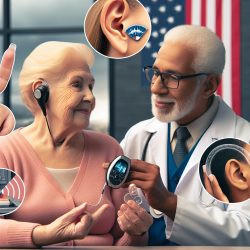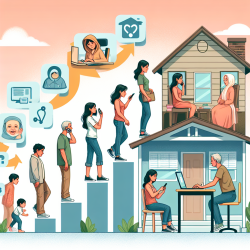Working with hard-of-hearing residents in care facilities presents unique challenges and opportunities for practitioners aiming to improve the quality of life through enhanced communication. A study focusing on hard-of-hearing residents in a home for the aged offers valuable insights into the complexities of addressing hearing impairments within this population. This research, conducted over two years, reveals critical findings that can guide practitioners in tailoring more effective communication strategies and interventions.
The study highlights the importance of understanding the specific communication environments and situations that are most impactful for residents. By identifying these key scenarios, practitioners can develop targeted strategies that address the real-world needs of the hard-of-hearing elderly. This approach not only improves the residents' quality of life but also fosters a sense of community and belonging within the care facility.
One of the study's significant findings is the differentiation between "optional" and "obligatory" activities in the lives of the residents. The participation in obligatory activities, such as dining and attending chapel services, was high, yet these were also the settings where residents reported the most significant communication challenges. In contrast, optional activities saw lower participation rates, but those who did participate reported fewer difficulties. This distinction underscores the need for practitioners to prioritize interventions in environments where the hard-of-hearing face the most substantial obstacles to participation and engagement.
Furthermore, the research emphasizes the role of audiologists and speech-language pathologists in adopting an ecological approach to rehabilitation. This involves considering not just the individual's hearing impairment but also the communication partner, the message, and the context of the communication. Interventions that address these multiple dimensions can lead to more meaningful improvements in communication function.
Practitioners are encouraged to employ a variety of treatment options, including personal hearing aids, assistive technology, and modifications to the physical environment, to enhance communication. Additionally, the importance of staff education and the establishment of mutual support networks within the facility cannot be overstated. These elements are crucial for creating a supportive ecosystem that promotes effective communication and reduces the sense of isolation among hard-of-hearing residents.
The study also reveals that the residents' cognitive status significantly impacts their ability to benefit from rehabilitation programs. This finding suggests that tailored approaches, which consider the cognitive abilities of each resident, are essential for the success of any intervention plan.
In conclusion, the research article "Hard-of-Hearing Residents in a Home for the Aged" provides critical insights into the challenges and opportunities for improving communication among hard-of-hearing elderly residents in care facilities. By implementing the outcomes of this research, practitioners can enhance their skills and develop more effective strategies for addressing the complex needs of this population. The ultimate goal is to improve the quality of life for hard-of-hearing residents by enabling more effective communication and participation in daily activities.
For those interested in delving deeper into the study and its findings, I highly recommend reading the original research paper. To access it, please follow this link: Hard-of-Hearing Residents in a Home for the Aged.










